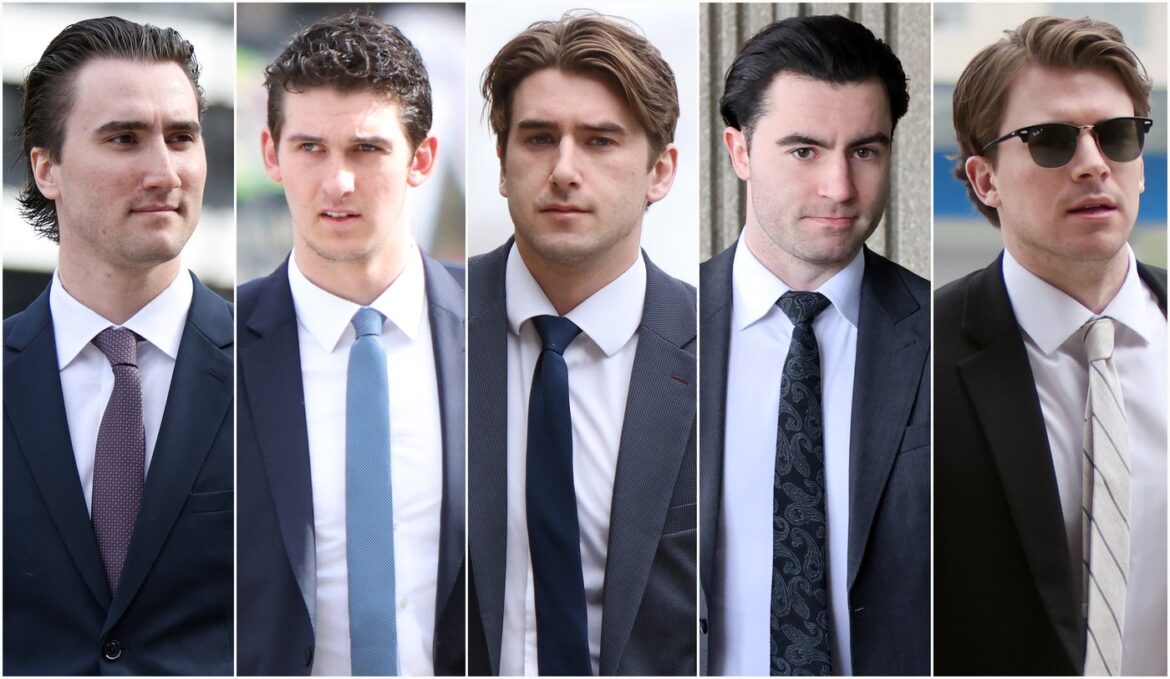The ongoing sexual assault trial involving five former members of Canada’s 2018 world junior hockey team entered a critical phase with the cross-examination of the complainant. The accused—Michael McLeod, Dillon Dube, Carter Hart, Cal Foote, and Alex Formenton—face charges related to an incident on June 19, 2018, at the Delta Armouries hotel in London, Ontario. The complainant alleges she was forcibly subjected to sexual acts while intoxicated, a claim the defense disputes, presenting an alternative account that challenges her recollection and consent. The trial, which began in April 2025, is being closely watched for its broader implications on consent and accountability within hockey culture and Canadian society.
Details of the Cross-Examination
During the defense’s cross-examination, attorneys sought to highlight inconsistencies in the complainant’s statements over time. They questioned her about differing versions of the events she recalled from the night of June 19, 2018, emphasizing discrepancies noted in previous interviews and testimonies. The defense aimed to undermine the credibility of her account by focusing on variations in her descriptions of consent, the sequence of events, and the degree of her intoxication.
Accused Players’ Response
The five accused former players—Michael McLeod, Dillon Dube, Carter Hart, Cal Foote, and Alex Formenton—have maintained their innocence throughout the trial. Their legal representatives argued that the complainant’s conflicting accounts cast doubt on the prosecution’s case. They presented alternative narratives asserting that any sexual contact was consensual, countering claims that the complainant was incapacitated or unwilling.
Legal and Social Implications
This trial is significant not only for the individuals involved but also for its wider impact on attitudes toward sexual assault in sports environments. Legal experts have noted that the case highlights challenges in prosecuting sexual assault cases where intoxication and consent are disputed. Moreover, the case is sparking conversations about accountability and culture within hockey, as well as prompting discussions on how institutions support victims and address misconduct allegations.
Trial Proceedings and Next Steps
The trial began in April 2025 and has been marked by detailed witness testimonies and extensive legal arguments. Following the cross-examination, the prosecution is expected to call additional witnesses to reinforce the complainant’s version of events. The court will continue to hear evidence before moving to closing statements and the jury deliberation phase. Observers note that the verdict will likely carry broader societal implications regarding consent laws and athlete conduct in Canada.
As the trial involving the five former members of Canada’s 2018 world junior hockey team progresses, the cross-examination phase has brought critical scrutiny to the conflicting accounts of the incident. The proceedings continue to underscore the complexities inherent in cases where consent and intoxication are contested. With further testimonies expected and the case moving toward its conclusion, the eventual verdict will not only affect the accused and the complainant but may also influence ongoing discussions about sexual assault protocols, accountability, and cultural change within sports communities across Canada.

